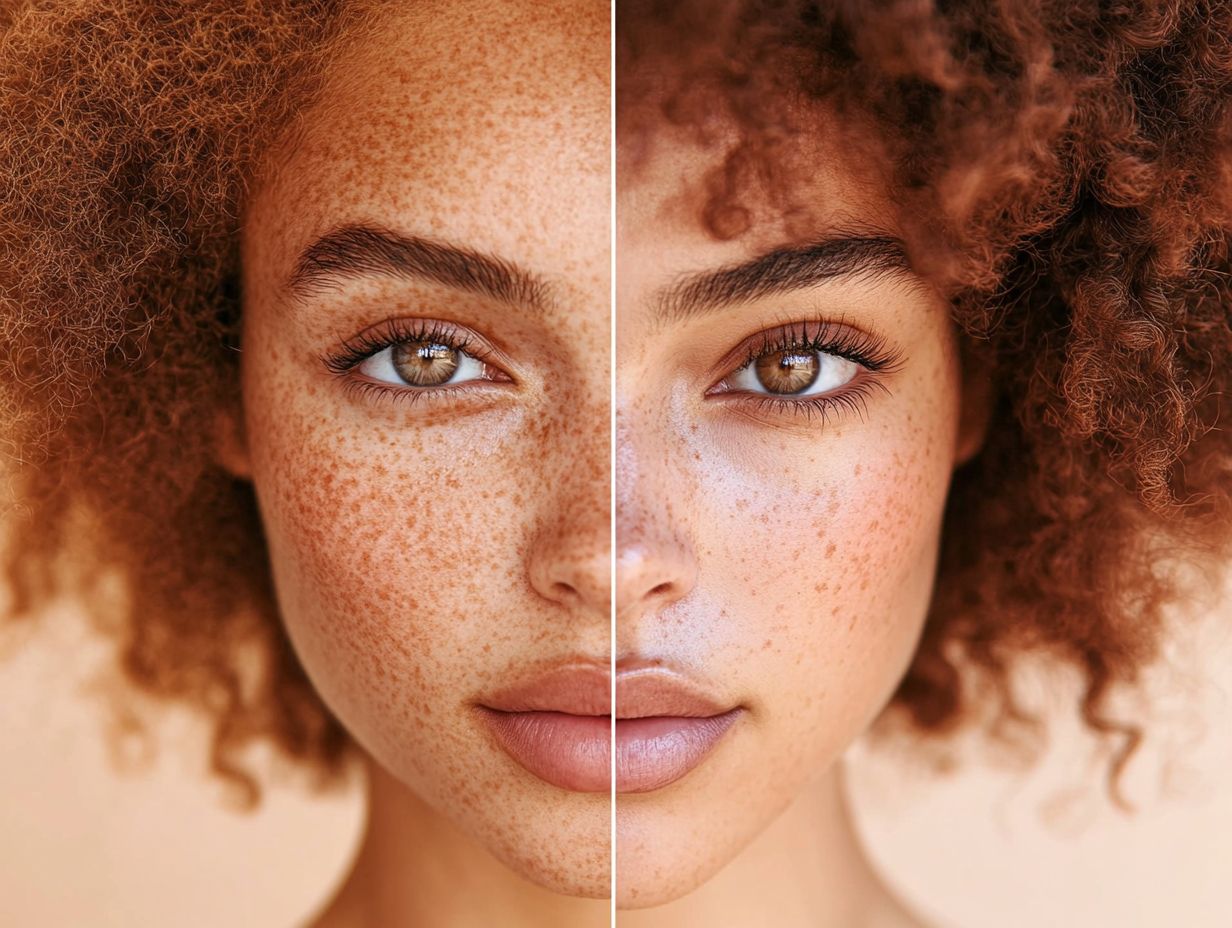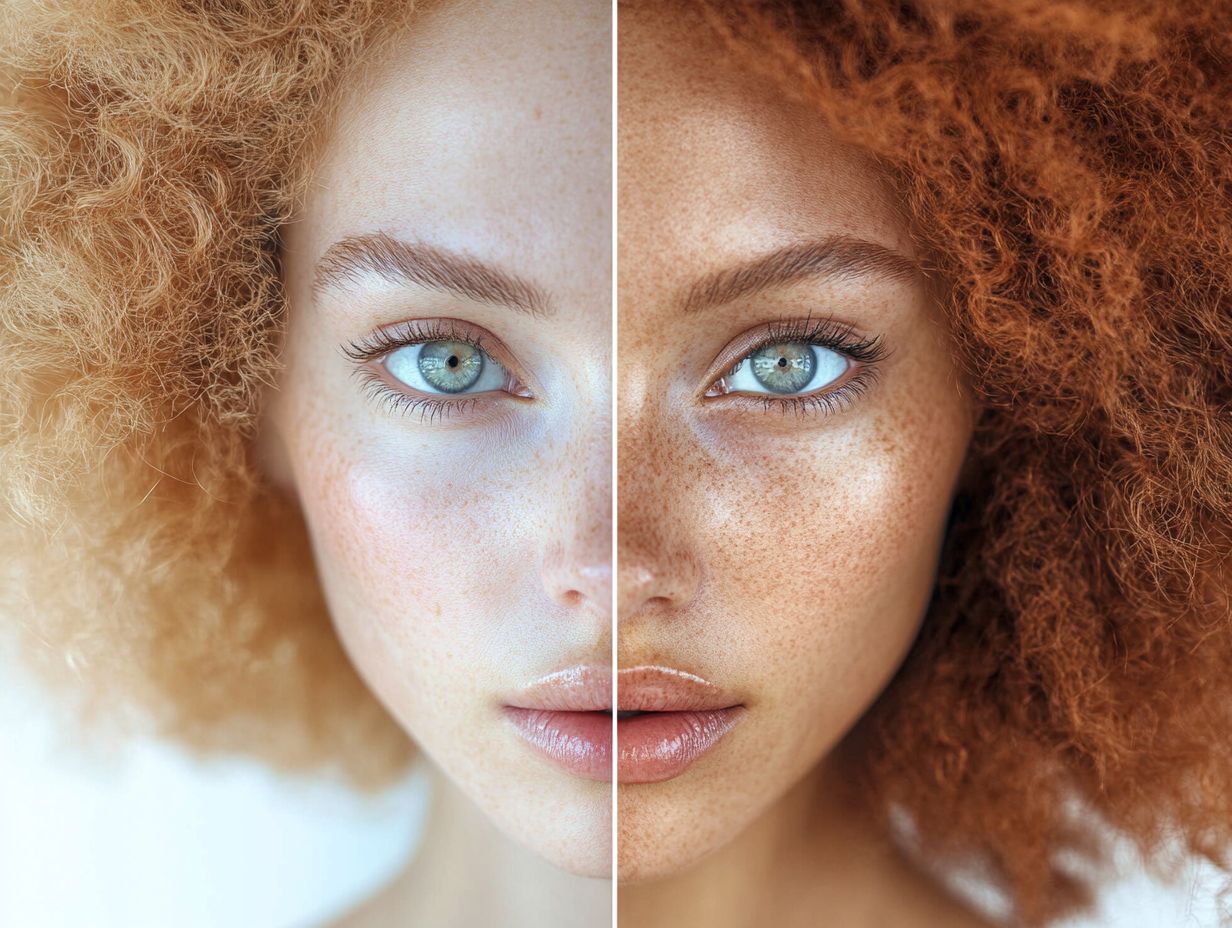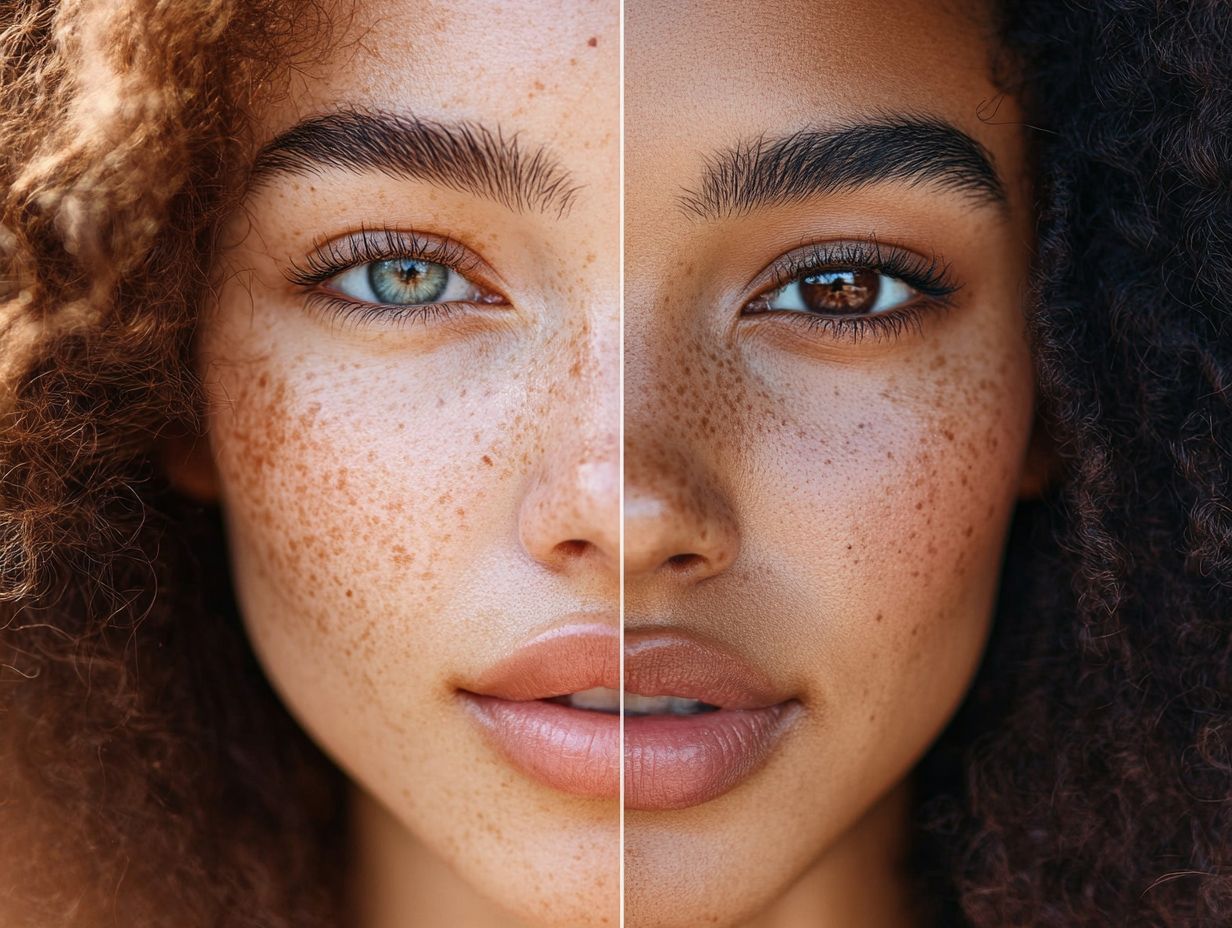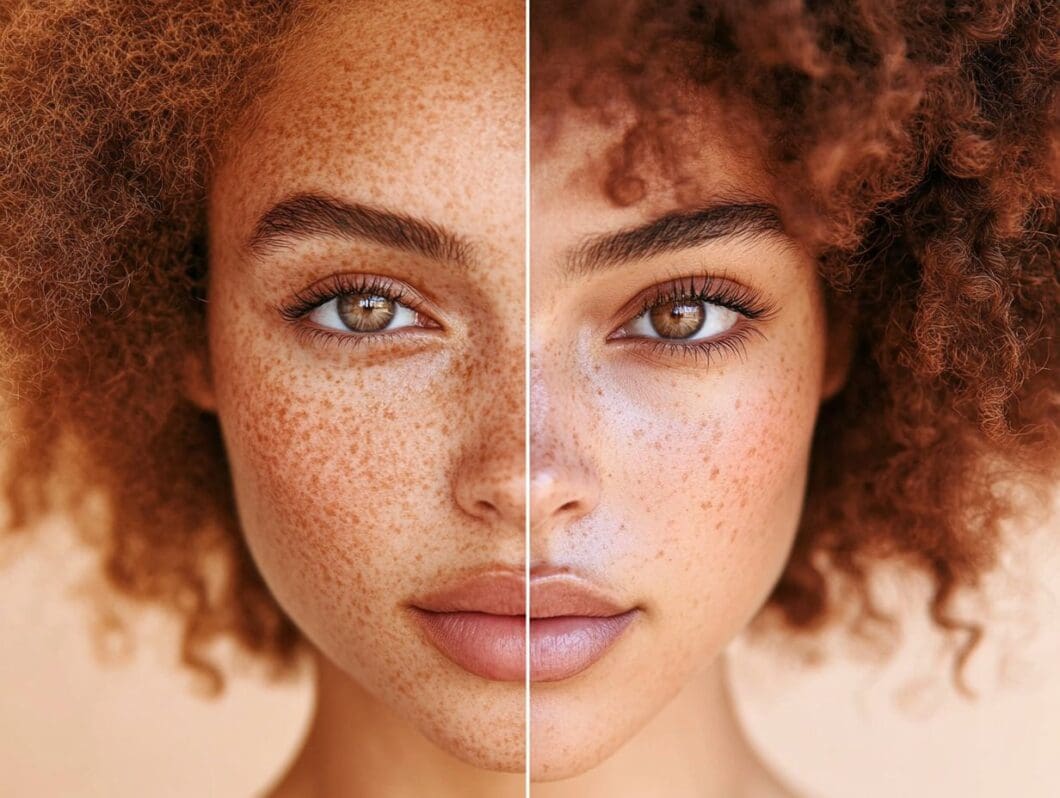Hormones play a crucial yet often overlooked role in the health of our skin and hair.
Fluctuations in hormone levels can lead to a range of common skin issues, like acne and dryness, while also affecting hair texture and contributing to hair loss.
Understanding how hormonal imbalances impact these areas is essential for developing effective skincare and haircare strategies.
This article explores the connection between hormones and appearance, and provides practical tips for managing these changes.
Key Takeaways:

Understanding the Role of Hormones
Hormones are essential in regulating numerous physiological processes within the human body and have a significant impact on skin health and appearance. The equilibrium of hormones, such as estrogen and testosterone, can influence skin conditions, including acne and melasma.
Moreover, specific phases of the menstrual cycle introduce hormonal fluctuations that result in various skin changes. Additionally, hormones like cortisol, which are frequently released in response to stress, can further disrupt skin balance.
This disruption affects multiple aspects, including oil production by sebaceous glands and collagen synthesis, ultimately impacting overall skin elasticity and hydration.
Effects of Hormones on Skin

The effects of hormones on the skin can manifest in various ways, significantly influencing its texture, tone, and overall health. For example, hormonal fluctuations can lead to increased sebum production, resulting in oily skin and conditions such as acne vulgaris and seborrhea.
Furthermore, hormonal changes during puberty and the menstrual cycle often exacerbate skin sensitivity and inflammation, leading to the occurrence of hormonal acne. Conversely, hormonal imbalances may also contribute to dry skin by disrupting the skin’s natural barrier, underscoring the complex interplay between hormones and skin health.
Common Skin Issues Caused by Hormonal Changes
Hormonal changes can result in a range of skin conditions, most notably hormonal acne, which is frequently triggered by fluctuations in testosterone and estrogen levels. Additionally, disorders such as melasma are influenced by hormonal imbalances, particularly during the luteal phase of the menstrual cycle or in cases of polycystic ovary syndrome (PCOS), where elevated androgen levels can impact skin pigmentation and texture. Understanding the relationship between these hormonal fluctuations and skin conditions can enable individuals to manage their skin health more effectively.
During the follicular phase, for example, estrogen levels rise, which may enhance skin appearance for some individuals; however, others may still experience breakouts. As the luteal phase approaches, progesterone levels increase, often exacerbating acne and triggering melasma in susceptible individuals.
Recognizing these patterns is essential, as appropriate hormonal therapies, such as oral contraceptives or hormone replacement therapy, can help regulate these fluctuations, potentially resulting in clearer skin. By exploring these treatment options, individuals may find considerable relief from the persistent effects of hormonal imbalances on their skin.
Effects of Hormones on Hair

Hormones significantly influence hair growth and texture, affecting both the quality and quantity of hair in individuals. Specifically, hormones such as testosterone and its derivatives interact with androgen receptors in hair follicles, promoting hair growth in areas such as the face and body.
This hormonal activity can also lead to conditions such as hirsutism and hyperandrogenism. Furthermore, these hormonal effects may alter hair texture, often resulting in noticeable changes during various life stages, including puberty and pregnancy.
Hair Loss and Changes in Hair Texture
Hair loss and changes in hair texture are frequently linked to hormonal imbalances that disrupt the normal hair growth cycle. For instance, fluctuations in hormones such as estrogen and testosterone can significantly impact hair follicle health, leading to thinning hair or increased shedding. Hormonal conditions, including polycystic ovary syndrome (PCOS) and menopause, can intensify these changes, as shifts in hormone levels alter the responsiveness of hair follicles, resulting in diminished vitality and modifications in hair texture.
Understanding these specific causes is essential for developing effective management strategies. Hormonal changes can directly influence the anagen, catagen, and telogen phases of hair growth, potentially leading to premature hair loss or slowed regrowth.
Treatment options may include lifestyle modifications, such as dietary adjustments and stress management, as well as medical interventions like hormone replacement therapy and topical solutions designed to rejuvenate the follicles.
Consulting with healthcare professionals can offer personalized approaches, considering individual hormonal profiles to formulate a tailored plan focused on restoring hair health and mitigating the effects of these imbalances.
Hormonal Imbalance and Its Impact on Skin and Hair

Hormonal imbalances can significantly impact both skin and hair health, resulting in notable changes to their appearance. For instance, an imbalance in hormones, such as cortisol, may cause sebaceous glands to produce excess oil, which can contribute to acne and other dermatological conditions.
Furthermore, genetics influence how these hormonal fluctuations manifest, leading to diverse effects on hair growth and texture. This variability is particularly evident in relation to stress management practices and the utilization of hormonal therapies.
Identifying and Addressing Imbalances
Identifying and addressing hormonal imbalances is essential for enhancing overall skin and hair health. Recognizing symptoms such as persistent acne, hair thinning, or changes in texture serves as a critical first step toward understanding the underlying hormonal causes, which may include elevated cortisol levels or other hormonal discrepancies.
Once these imbalances are identified, a range of hormonal therapies, lifestyle modifications, and dietary adjustments can be implemented to restore equilibrium and promote healthier skin and hair outcomes.
It is imperative for individuals to monitor not only visible signs but also their overall well-being, as hormonal fluctuations can manifest through mood disturbances, increased fatigue, or sleep irregularities. Consulting with healthcare professionals for comprehensive assessments, such as blood tests or skin evaluations, can reveal specific imbalances.
Effective treatment options may encompass hormone replacement therapy or natural supplements designed to restore balance.
Incorporating stress management strategies, such as yoga and mindfulness practices, along with a balanced diet rich in essential nutrients, can significantly improve both skin vitality and hair strength. This approach ultimately fosters a more holistic perspective on personal health.
Managing Hormonal Changes for Healthy Skin and Hair
Effectively managing hormonal changes is crucial for maintaining healthy skin and hair, particularly during various life stages. A customized skincare regimen that targets specific concerns, such as acne or dryness, can help alleviate the impacts of hormonal fluctuations.
In addition, implementing haircare strategies that emphasize hydration and nourishment can address alterations in hair texture and help prevent hair loss. This approach is especially beneficial when paired with appropriate hormonal therapies to address any underlying imbalances.
Effective Skincare and Haircare Strategies
Developing effective skincare and haircare strategies is essential for managing the effects of hormonal changes on skin and hair health. A well-structured skincare regimen should prioritize hydration and incorporate anti-inflammatory ingredients to soothe irritated skin while addressing specific issues such as hormonal acne.
Likewise, haircare strategies that focus on maintaining moisture and nurturing hair follicles can mitigate the impact of hormonal imbalances, potentially enhanced by the inclusion of hormonal therapies as part of a comprehensive approach.
In this context, utilizing products containing hyaluronic acid can significantly enhance skin hydration, while niacinamide is effective in reducing inflammation and redness. The incorporation of retinoids may facilitate cell turnover, thereby minimizing breakouts.
For haircare, it is advisable to consider nourishing oils such as argan or jojoba to retain moisture and strengthen hair strands. Additionally, a weekly deep conditioning mask can provide an extra layer of protection, promoting overall hair health.
Emphasizing a regimen that balances these elements will not only address immediate concerns but also support long-term vitality and radiance.


